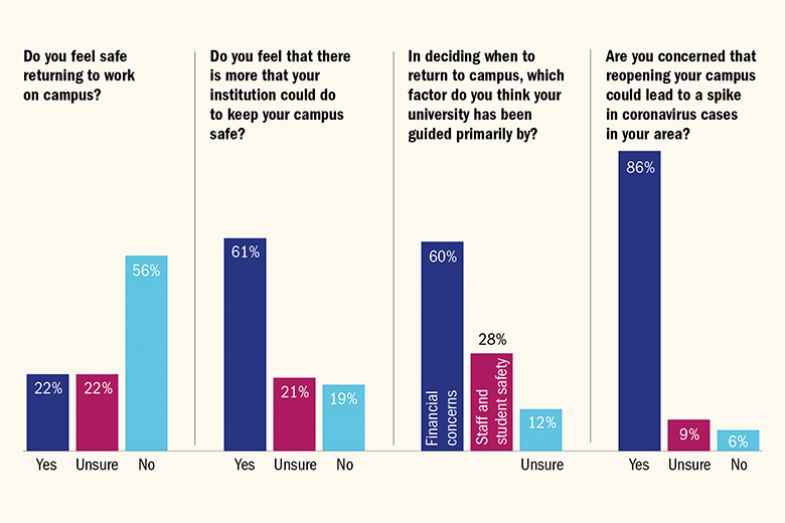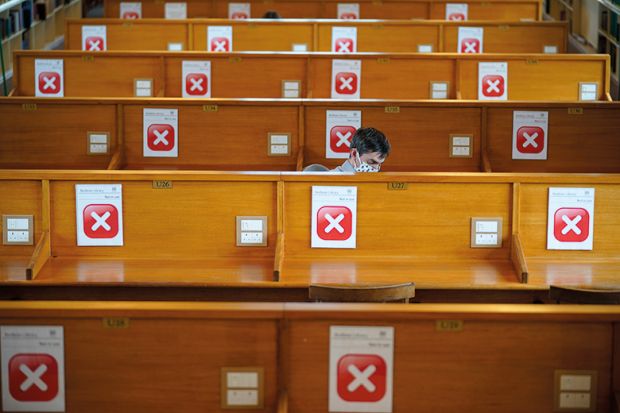Global survey conducted by THE reveals concerns that reopening universities could drive spikes in infections and that financial concerns are being prioritised over well-being
Less than one in four university staff feel safe returning to work on campus as coronavirus continues to spread, according to a global survey conducted by Times Higher Education.
In the survey, which was completed by 1,195 academics and higher education professionals around the world, nearly nine out of 10 respondents said that they were concerned that reopening campuses could lead to a spike in Covid-19 cases in their area. By a two-to-one margin, respondents identified financial concerns as the key factor in institutions’ reopening plans, ahead of staff and student safety.
The results of the survey, which was open from 4 to 14 September, emerge as campus reopenings in key sectors such as the UK and US coincide with a surge in infection rates across the globe.
Two-thirds of respondents said that their university was requiring them to return to campus, even if only partly, within the next two months. But most – 56 per cent – said that they would not feel safe going back, with 22 per cent saying that they would, and 22 per cent unsure.
Sixty-one per cent of respondents said that they felt that their universities could do more to keep them safe on campus. Asked what their university had prioritised in their reopening plans, 60 per cent identified financial concerns, while 28 per cent said staff and student well-being, and 12 per cent were unsure.
Academics were more likely to be made to return to campus than professional staff (72 per cent versus 52 per cent), and were more likely to say that they felt unsafe doing so (62 per cent versus 40 per cent).
In comments, respondents expressed their concerns about the year ahead, with one saying that they had “never been so anxious before the start of a new academic year”. “I’m extremely worried and scared about everything. I have worked throughout the entire summer trying my best to plan and prepare but I’m still not ready. I feel emotionally burnt out already,” the respondent said.
A significant majority of respondents to THE’s survey were from the UK, where the 2020-21 academic year is just getting under way. Responses from the UK reflected the overall results, with 58 per cent saying they did not feel safe returning to work on campus.

Debate over the safety of reopening UK campuses has reached a climax over the last week after the government’s Scientific Advisory Group for Emergencies (Sage) warned of a “significant risk” that the reopening of university campuses could amplify coronavirus transmission. The government’s suggestion that teaching could be made safer by opening doors or windows or even teaching outside was described by the University and College Union (UCU) as “not a practical suggestion for England during the winter months”.
Many of the UK survey responses direct their anger primarily at the government rather than sector leaders, with one highlighting the “lack of clarity from government”, which “has made it very challenging to plan for reopening campuses, and guidance when it has come has been much too late”.
Although there were significantly fewer responses to the survey from university employees based in the US – 53 in total – the answers reflected the spikes in coronavirus cases that have been seen on American campuses which have welcomed students back in recent weeks. Seventy per cent said that they did not feel safe going back.
US campuses have recorded 60,000 infections since late August, and several have cancelled in-person classes or evicted students. Others are facing protests and lawsuits demanding fee reductions.
Many college presidents have insisted that reopening US campuses was the best move for most students, especially those from low-income backgrounds who rely on their institutions for study space and other support.
Michael Crow, the president of Arizona State University, said it was too early to know if the strategy will prove successful, given the persistence of the virus. But, Professor Crow said in an interview, “it makes sense to try”.
Other respondents to THE’s survey argued that universities were “over-reacting”. “If cleaners, bar staff, waiters, chefs, porters, drivers and a whole range of professions are back at work, why are academics special? We should all play our part and come back to work,” one respondent said.
Gail Kinman, visiting professor of occupational health at Birkbeck, University of London, said that high staff anxiety levels would have a significant impact on UK campus life this year. Worries about commutes or caring responsibilities would be compounded by the need to get to grips with the new system of blended learning and the increased workload associated with it, she warned.
“The problem is the huge variations across the sector,” Professor Kinman said. “Some institutions really are doing best practices, while others are lacking…the messaging is not consistent and that is a reflection of the country as a whole.”
UCU general secretary Jo Grady said that THE’s survey revealed “well-founded worries” about safety and argued that all learning should stay online.
Raj Jethwa, chief executive of the UK’s Universities and Colleges Employers Association, said that “staff anxieties about returning to campus are understandable, but all higher education institutions are working incredibly hard to protect students and staff”.
anna.mckie@timeshighereducation.com
‘We are stuck in a no-win situation’: voices from THE’s global survey
- I think my university has done all it reasonably can, but so much depends on the behaviour of students outside classes and off campus, over which we have very little control. We are also likely to be heavily dependent on a government test-and-trace service, which so far appears to be shambolic.
- Financial pressures have led to universities wanting to reopen too soon. Doing so while we’re still in the grip of a pandemic is irresponsible and puts hundreds, if not thousands, of lives at risk.
- My university’s response has been shambolic and unethical. We are totally unready to commence the semester. There has been no relief from teaching in recognition of the extra work we must do and I suspect students are being lured back under false pretences and we will return to entirely online provision as soon as it’s too late for their tuition to be refunded.
- I’m a shielder and there has been zero information or equality-impact assessment for high-risk staff and whether there will be reasonable adjustments made so the most vulnerable can continue to work from home. It’s a grave worry that we will be simply deemed expendable and lose our jobs.
- My institution wants staff to show “willing”, which carries an undertone about who will comply, informing future restructuring and job cuts. It’s again the most vulnerable (health, precarious contract or low level in hierarchy) who will be worst affected. I’m disappointed that a sector which boasts morals and ethics in teaching and research is being so duplicitous and socially unjust.
- When it comes to reopening the campus there’s a fine balance to be struck. Staff and student well-being is more than just preventing the spread of Covid-19. Students at our college also need the experience of being in the classroom and meeting fellow students. If this wasn’t necessary, then we could keep the campus closed and teach fully online.
- We are stuck in a no-win situation. If we don’t go back, we’ll be vilified in the media for not giving a robust experience. If we go back and it leads to a spike, young people and universities will be blamed.
- Frankly, while I’m disappointed with the university, real responsibility lies with the government. They have not sufficiently reduced transmission, addressed [the] tracing issue, provided extra testing capacity or given universities the financial backing to make the sound decisions needed.


0 Comments